IT Pro Panel: Building a data-driven business
Data analytics may be one of the hottest trends of the moment, but it’s not as simple as it sounds


Over the past year or so, a maxim has crept into the IT industry's common lexicon: "Data is the new oil". In other words, it's a precious resource that has the potential to be extremely useful and incredibly valuable.
With this in mind, many organisations are now seeking to transform themselves into "data-driven businesses", making use of tools like data analytics and machine learning to extract value from the vast reams of information they generate on a daily basis.
This task isn't necessarily as simple as it sounds, though. Becoming a data-centric organisation can be a long and challenging process, with many potential hazards to navigate. In this month's IT Pro Panel discussion, we spoke to some of our expert panellists who have been through this journey to get their insights on how best to navigate the road to data nirvana.
Driving business outcomes
Speaking to our panellists, it quickly becomes clear that the wave of interest around data is more than just empty hype. It can have a real, tangible impact on multiple areas throughout a company, as Ritam Gandhi, founder of digital design firm Studio Graphene, explains.
"What I have realised is that 'data' touches nearly every part of our business," he says "We use data gathered on user engagement across websites we build to inform decisions taken by our digital marketing team. We use data collected as a result of user testing to inform UX decisions taken by our design team. We use historical data collected on a variety of tasks by our project management team to predict how long a particular project is going to take to complete."
This use of user behaviour data gathered from within applications and websites to improve and optimise them is one of the most universal examples of data analysis in action, but it can also enable business-critical functions such as security.
"As a business with a large online presence, William Hill uses data much like any online retailer," says William Hill's group CISO Killian Faughnan. "With a heavy focus on improving customer experience and service. From my own perspective in security, and perhaps where I can speak more authoritatively on the subject, we use it primarily for the automation of our protection platforms and security controls."
Get the ITPro daily newsletter
Sign up today and you will receive a free copy of our Future Focus 2025 report - the leading guidance on AI, cybersecurity and other IT challenges as per 700+ senior executives
"We pull in data from every layer of our infrastructure so that we can kick off predefined playbooks to reduce the impact to our customers of directed attacks," he explains. "Without access to the vast quantity of data available through modern information systems we would simply be unable to protect the business in the way we do today."
In some cases, data analysis can help augment and support gut feeling, providing a solid foundation for business decisions when personal instinct cannot solely be relied upon. This can come in particularly handy if the business finds itself in a "brain drain" situation where it lacks in-house expertise in certain areas - with Addison Lee being a prime example.
"Addison Lee spent 38 years under private family ownership, where they knew the business and market inside out," chief data officer Graeme McDermott reveals. "However, when it was sold to a private equity firm and the many family members moved on, they needed to revert to data and insight to make decisions - not least as their market was disrupted by the arrival of Uber. Now they use data and tech to the extreme."
"Data is vital in the humanitarian sector," adds Oxfam International CIO Michael Duggan. "When a disaster happens, it's essential to get timely data in order to support critical decisions on what type of aid is needed, how to get it there and making sure it's used in the most effective way possible."
Big data, little data
One of the first hurdles for any business to overcome when planning a data strategy is deciding what data they need to collect.
"I think the starting point is for organisations to identify what they are trying to achieve from 'data'," Studio Graphene's Gandhi says. "They then need to identify what data sources they have access to and lastly what treatment needs to be applied to the data set in order to make it valuable to them."
For McDermott, the obvious starting point is data on your clients or customers, and on any transnational business you're doing.
"Clearly, as a data exploitation person at heart, I want it all. But the reality is not all of it adds value or richness," he says. "I suppose the crucial point is to evaluate systems you implement to support your product and ask 'where is the data, what does it collect and how easy is it for me to get to?'"
However, another important consideration raised by Duggan is that of safety and compliance, particularly in a post-GDPR world. Organisations, he says, don't just need to be legally compliant, but must also have a set of ethical guidelines about acceptable data use - something that he thinks will become a critical factor in organisational governance.
"Many data projects use a lot of personally identifiable information," he points out. "If you don't ensure you understand your data risks adequately you might set yourself up for a lot of pain later.
"Most of the data we collect is about people, many of whom are vulnerable. An expression I heard last year was that 'If data is the new oil, data protection is the new climate change'. "As a result we are putting a lot of energy into making sure the way we collect data is safe, and the way we store and share it is safe."
Ensuring the accuracy of the data they're analysing is also a key concern for all our panellists. As a CISO, the margin for error in Faughnan's data analysis is close to zero, so he goes to great pains to make sure it's as accurate as possible.
"I've not found a silver bullet that's for sure. From my own experience I've found I need to categorise data sources as either 'reliable' or 'unreliable' and act accordingly," he says. "Once you start watering down the quality, you begin to add in uncertainty to the decision tree, which, for us, means human intervention is required."
He does, however, accept that a certain amount of flexibility is required when it comes to the quality of data being processed in non-business critical analysis, arguing that "realistically, outside of mission-critical circumstances, unreliable data is the norm and businesses need to be cognisant and accepting of this."
"What I tend to say is that 'Big Data' is informed by 'Little Data'," Duggan argues, "which can give us an insight and potentially a way of understanding if our analysis of Big Data is right. Given the velocity of many of our operations, it's unlikely our Big Data set is as good as we would like it to be, so it's important to have strong check on making decisions. The best thing being people on the ground who can assess."
"Michael's point is so true," McDermott agrees. "A few years ago I saw a presenter talk about the 'data underdogs'. His summary was 'don't forget about the smaller, less important data items as a way of explaining what's really going on'."
A question of hype
This is one of the potential pitfalls organisations can fall into when looking at data, but it's far from the only one. The most common issue identified by our panellists as a possible threat to the success of a data programme is a poorly-thought out or unrealistic strategy. As Duggan points out, a data-driven organisation is in many ways a different beast from a more traditional company.
"A key question is if your business model is designed for data-centric decision making," he says. "A lot of organisations have a very linear value chain - a bit like Porter's value chain - which incrementally uses Big Data to make decisions but not in a transformational way. The models we see companies like Uber (and Addison Lee) shifting to are platform models where Big Data is used in real-time to influence things like capacity and pricing. It's a fundamentally different way of architecting your organisation."
In McDermott's view, it's imperative to strike the right balance between getting started with a proof-of-concept quickly, and adjusting it for long-term viability once the project has been approved. He points out that while delivering rapid time to value is important, if you don't take the time to reassess the technical architecture every so often, you can end up with an unstable end result.
"No one remembers that it was only a proof-of-concept until five years later, when the systems dies and someone asks why it was up on bricks. Trust me, it happened to me several times - with inherited systems, I might add," he explains. "If everyone's not on the same page about the final picture you'll have a crazy outcome. However, you can't be planned to the nth degree before starting."
For Faughnan, it's important to maintain a sense of perspective when looking at data projects, as many decision-makers tend to get carried away by the potential of data analysis without being realistic about what can actually be achieved.
"While we should definitely think strategically about where we want to get to, it's important to be pragmatic about how realistic it is to attain this nirvana, under what conditions, and in what timeframe. Give a glimpse of the blue sky distant future, but pitch a pragmatic solution that gets you some of the way there," he advises. "Be adventurous, but not irresponsible, in your approach."
In fact, all of our panellists agreed that although data analysis can have huge benefits, it has also been over-hyped to a certain degree.
"I think part of the challenge is that drawing inferences from a dataset isn't always as straightforward as one thinks," says Gandhi. "Organisations often jump to incorrect conclusions because of the way they've interpreted the data they have or often because they do not have a large enough data set to draw an accurate conclusion."
"I think there has to be a sense of realism here," Duggan muses. "Many might think that data is 'cheap' or easy but good, clean data is actually expensive to acquire ... this is why many data projects stall when they get out of pilot as organisations struggle to scale."
"Like every new innovation we overestimate the initial impact, but underestimate the longer term change it will make at industry level. I suspect Graeme is at the heart of this, as he's competing with an organisation built around data: Uber."
Fundamentally, however, data - and the insights that it gives access to - remains an integral part of all of the panellists' businesses. While it can be challenging to effectively exploit, it can deliver real value to organisations, assuming they approach it in the right way.
If you're a senior IT decision-maker and you'd like to apply to be part of the IT Pro Panel, please email panel@itpro.co.uk.
Adam Shepherd has been a technology journalist since 2015, covering everything from cloud storage and security, to smartphones and servers. Over the course of his career, he’s seen the spread of 5G, the growing ubiquity of wireless devices, and the start of the connected revolution. He’s also been to more trade shows and technology conferences than he cares to count.
Adam is an avid follower of the latest hardware innovations, and he is never happier than when tinkering with complex network configurations, or exploring a new Linux distro. He was also previously a co-host on the ITPro Podcast, where he was often found ranting about his love of strange gadgets, his disdain for Windows Mobile, and everything in between.
You can find Adam tweeting about enterprise technology (or more often bad jokes) @AdamShepherUK.
-
 Cheap cyber crime kits can be bought on the dark web for less than $25
Cheap cyber crime kits can be bought on the dark web for less than $25News Research from NordVPN shows phishing kits are now widely available on the dark web and via messaging apps like Telegram, and are often selling for less than $25.
By Emma Woollacott Published
-
 Redis unveils new tools for developers working on AI applications
Redis unveils new tools for developers working on AI applicationsNews Redis has announced new tools aimed at making it easier for AI developers to build applications and optimize large language model (LLM) outputs.
By Ross Kelly Published
-
 Empowering enterprises with AI: Entering the era of choice
Empowering enterprises with AI: Entering the era of choicewhitepaper How High Performance Computing (HPC) is making great ideas greater, bringing out their boundless potential, and driving innovation forward
By ITPro Last updated
-
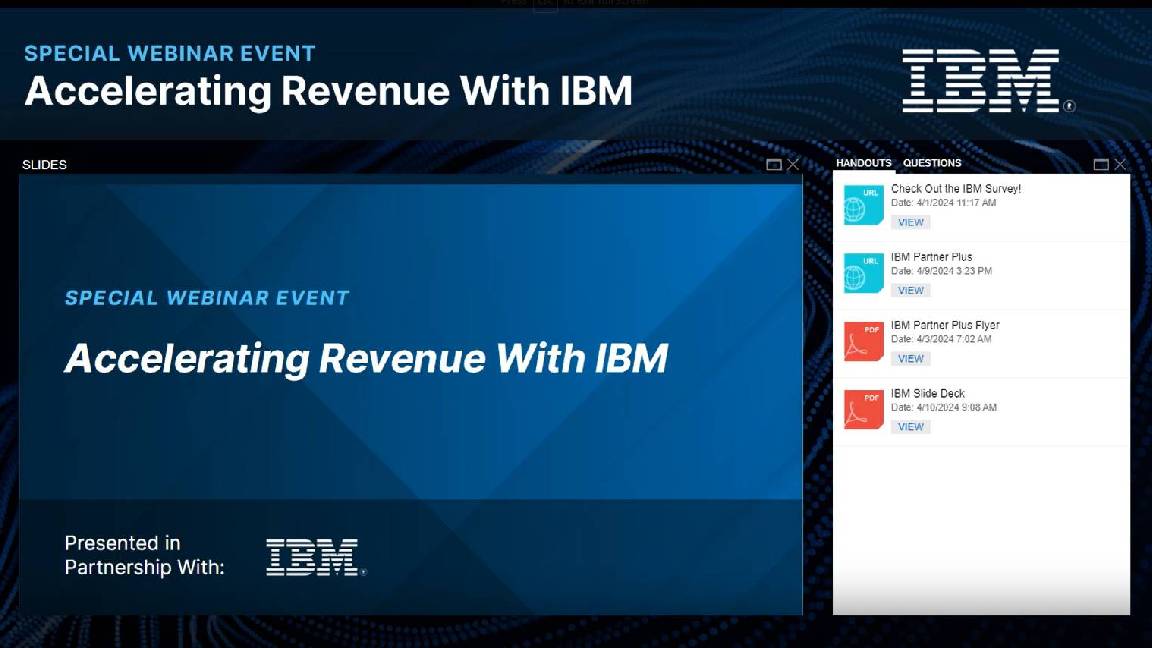 Accelerating revenue with IBM
Accelerating revenue with IBMwhitepaper Increase your impact and grow new revenue streams
By ITPro Published
-
 IDC MarketScape: Worldwide supply chain Oracle ecosystem services vendor assessment
IDC MarketScape: Worldwide supply chain Oracle ecosystem services vendor assessmentWhitepaper In-depth assessment of IT consulting providers supporting supply chain management processes
By ITPro Published
-
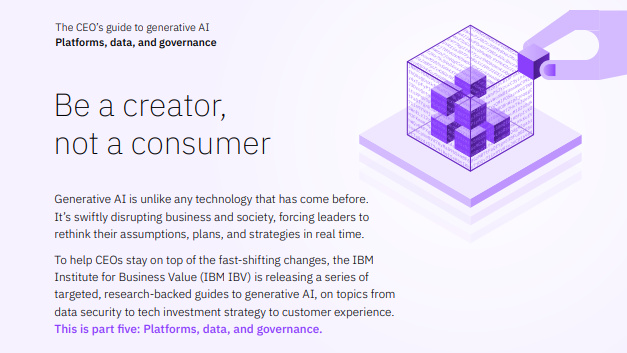 The CEO's guide to generative AI: Be a creator, not a consumer
The CEO's guide to generative AI: Be a creator, not a consumerWhitepaper Innovate your business model with modern IT architecture, and the principles of trustworthy AI
By ITPro Published
-
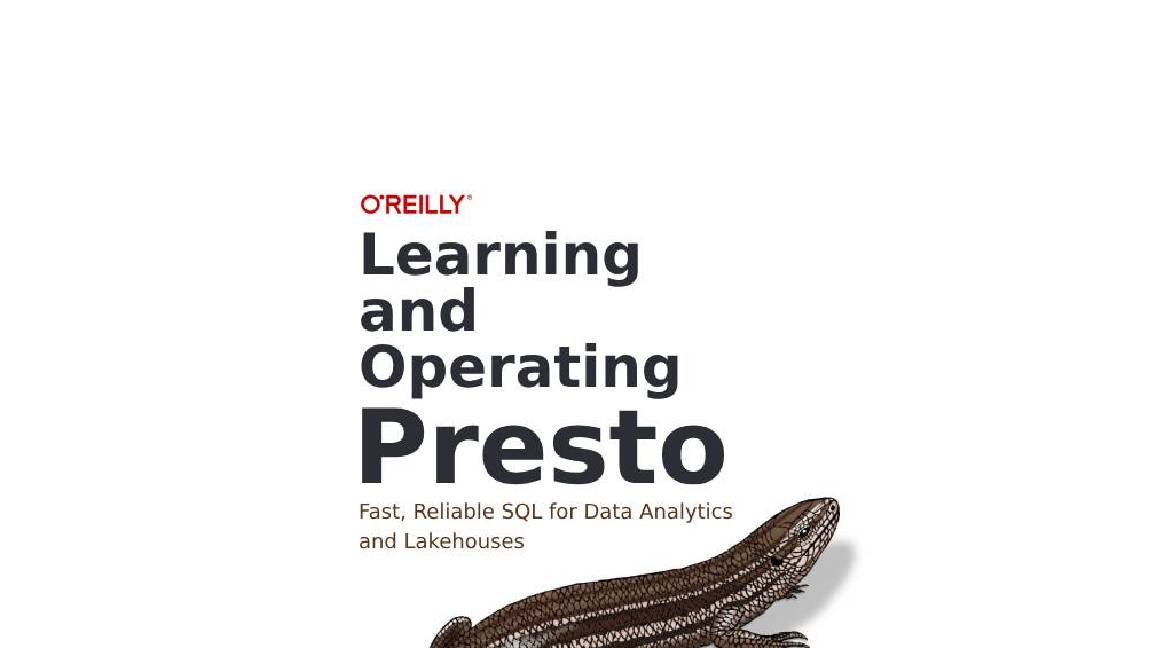 Learning and operating Presto
Learning and operating Prestowhitepaper Meet your team’s warehouse and lakehouse infrastructure needs
By ITPro Published
-
 Scale AI workloads: An open data lakehouse approach
Scale AI workloads: An open data lakehouse approachwhitepaper Combine the advantages of data warehouses and data lakes within a new managed cloud service
By ITPro Published
-
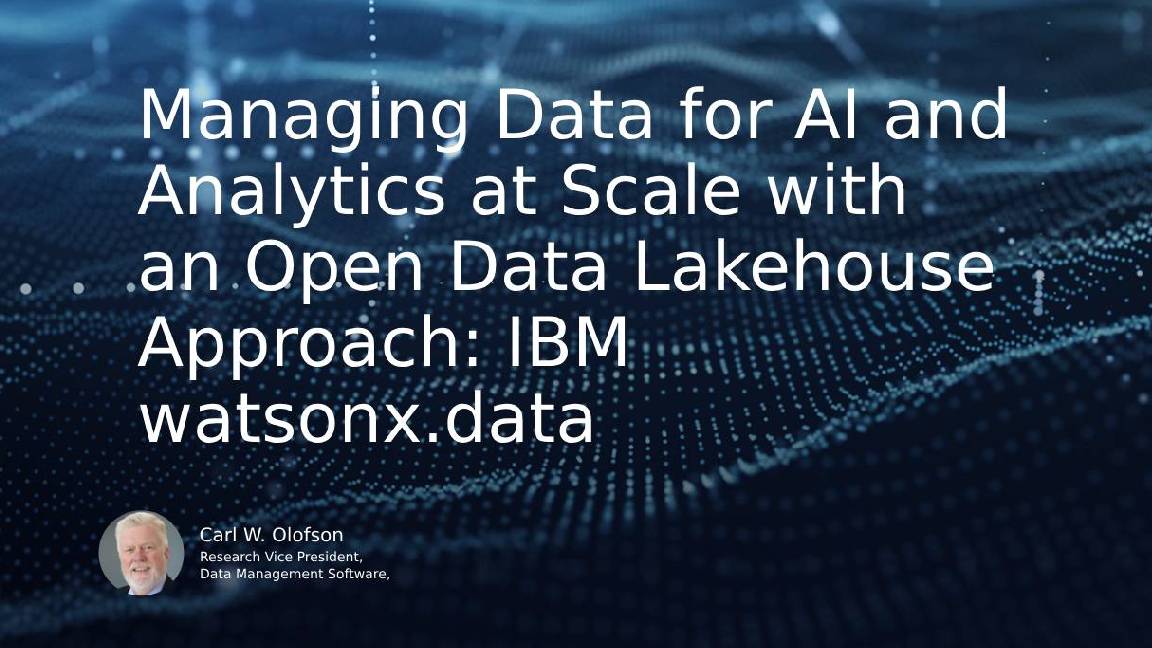 Managing data for AI and analytics at scale with an Open Data Lakehouse approach
Managing data for AI and analytics at scale with an Open Data Lakehouse approachwhitepaper Discover a fit-for-purpose data store to scale AI workloads
By ITPro Published
-
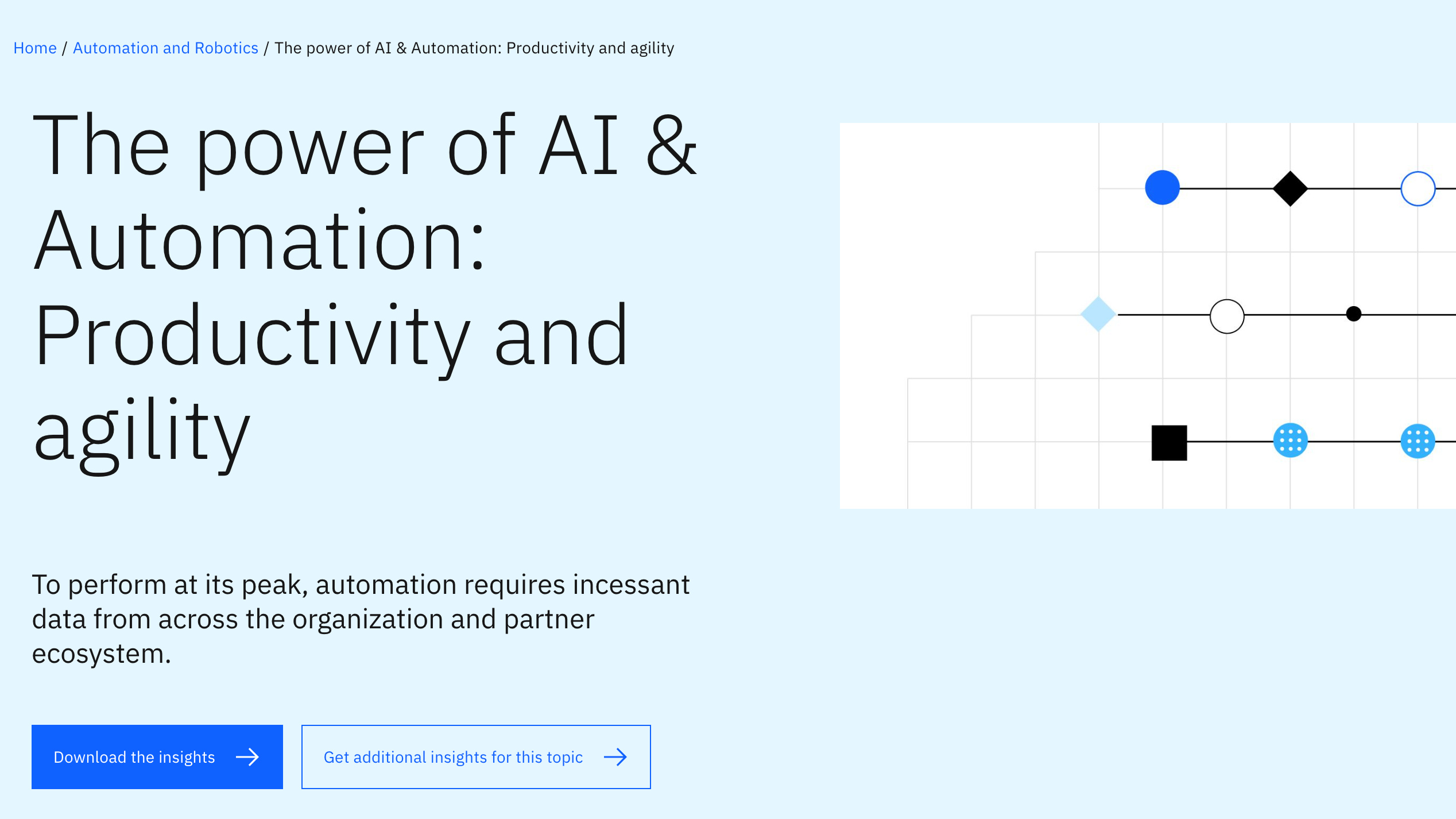 The power of AI & automation: Productivity and agility
The power of AI & automation: Productivity and agilitywhitepaper To perform at its peak, automation requires incessant data from across the organization and partner ecosystem
By ITPro Published